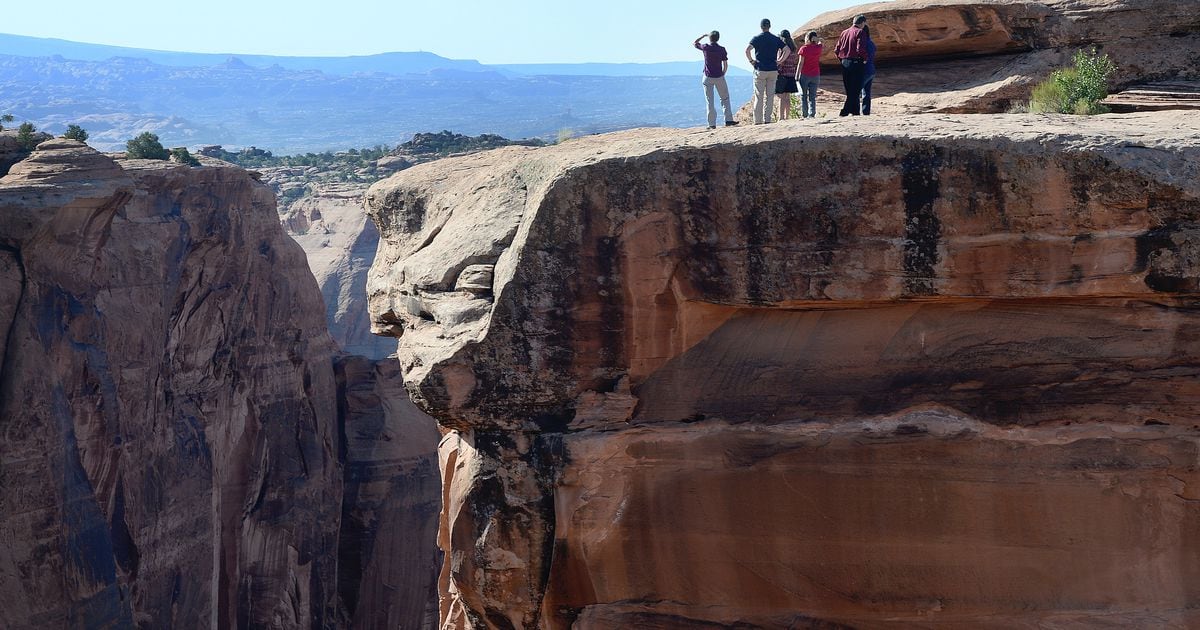Lee introduced the Outdoors Disability Act in the U.S. Senate last week.
(Scott Sommerdorff | The Salt Lake Tribune) Former U.S. Secretary of the Interior Sally Jewell, far left, takes in the view during a tour of the Gemini Bridges area in 2016. The Bureau of Land Management announced in October that it would close some off-road trails in the Labyrinth Rims/Gemini Bridges Travel Management Area, and Sen. Mike Lee, R-Utah, has introduced legislation to have the Interior Department update its plan to keep the routes open and improve access for people with disabilities.
| June 19, 2024, 12:00 pm
Sen. Mike Lee of Utah is spearheading a bill to give more people access to America’s natural wonders, with the goal of building more roads over them.
While Lee argues the Americans with Disabilities Outdoors Act will create more equitable access to the outdoors, some disability advocates told The Salt Lake Tribune the effort is disingenuous and reinforces the stereotypes they are trying to dispel.
Shiren Nagakiry, founder and president of the nonprofit group Disabled Hikers, called the bill “a blatant attempt to scapegoat disability as an excuse for building roads.”
“People who are opposed to disability inclusion and accessibility blame people with disabilities, saying that what we want is to ‘pave over the wilderness,'” they say. “That is not what we want in any way, shape or form, and that is exactly what this bill is leaning towards.”
Governor Lee introduced the bill in the U.S. Senate last week, saying, “Federal lands belong to the American people and are funded with taxpayer dollars.”
“Making these lands accessible to everyone isn’t just a matter of convenience, it’s essential to ensuring all citizens can explore the natural wonders our great country has to offer,” he continued.
Biden’s BLM Utah road closures spark lawsuits
After the Bureau of Land Management announced last year that it would close the road near Moab, environmentalists celebrated, off-road enthusiasts sued and elected officials accused the agency of abusing federal power.
The BLM released a new Travel Management Plan for the Labyrinth Rims/Gemini Bridges Travel Management Area in late September. The update closed 317.2 miles of routes previously open to off-road and passenger vehicles in the 300,000-acre area. The plan opens 800 miles of routes to motor vehicle use.
Lee’s bill would require the BLM and the U.S. Forest Service to develop and update travel management plans that prioritize accessibility. Roads on public lands must allow access for hunting, fishing, hiking, camping, off-roading, and other recreational activities and “ensure that public lands are accessible to individuals with disabilities,” according to the bill.
The law defines “land accessible to persons with disabilities” as land with at least 2.5 miles of roadway access for automobiles or off-road vehicles per square mile.
Lee’s bill also would require that motor vehicle traffic on public land not be restricted to the extent that it makes it inaccessible to people with disabilities.
In its plan for the Labyrinth Rims/Gemini Bridge, the BLM said the road closures were intended to protect wildlife, preserve sensitive watersheds and protect cultural heritage. The agency also cited conflicts between motorized and non-motorized recreational users, including off-road vehicles and river rafting users.
“Federal land managers are required to analyze the impacts of their decisions on the land, but they have no obligation to ensure that those decisions won’t harm Americans with disabilities,” said Ben Barr, executive director of the recreation advocacy group Blue Ribbon Coalition.
“Every time a rural road closure is announced, we hear from Americans with disabilities who feel discriminated against and ignored,” he added.
The state of Utah and off-road advocates objected shortly after the BLM announced its plans to close the road near Moab. Reg Johnson, executive director of the Utah Office of Public Lands Policy Coordination, said the BLM’s plan was an example of a “gross abuse of authority.”
The state argued that the BLM’s plan violates R.S. 2477, a 19th-century law that allows county road construction on public lands. Motorized recreation groups the Blue Ribbon Coalition and Colorado Off-Road Trail Defenders said the BLM ignored public input on the proposed road closures when crafting its final plan.
The state legislature also considered the issue of road closures on federal land. On the last day of the 2024 session, state lawmakers passed HB 471, the “Public Lands Occupation Amendment,” which allows the state and its counties to “ignore attempts to close roads without due process.”
Gov. Spencer Cox signed the bill, introduced by his rival, Republican Rep. Phil Lyman of Blanding, into law in March.
Wider Access
Nagakily said there are better ways to improve accessibility on public lands that don’t require road construction, such as improving power wheelchair access.
Stanton State Park and Great Sand Dunes National Park, both in Colorado, allow visitors with disabilities to experience these landscapes.
“From a public lands perspective, forcing the BLM and the Forest Service to add thousands of miles of roads onto otherwise pristine lands is a terrible idea,” said Aaron Weiss, deputy director of the nonprofit environmental group Center for Western Priorities. “It doesn’t actually do anything to improve accessibility.”
“This bill is like a stunt,” he continued.
In an email, a spokesperson for Senator Lee noted that the bill is supported by off-road group Trail Hero, which “dedicates to providing motorized access to the outdoors for individuals with special needs, veterans, and others who need mobility assistance.”
“These user groups aren’t asking for new trails to be developed,” said group founder Rich Klein, “they just want existing routes and trails to remain open so they can have the same therapeutic wilderness experience that able-bodied people can.”
Lee’s bill has been assigned to the Senate Energy and Natural Resources Committee, where Lee serves on the committee.

